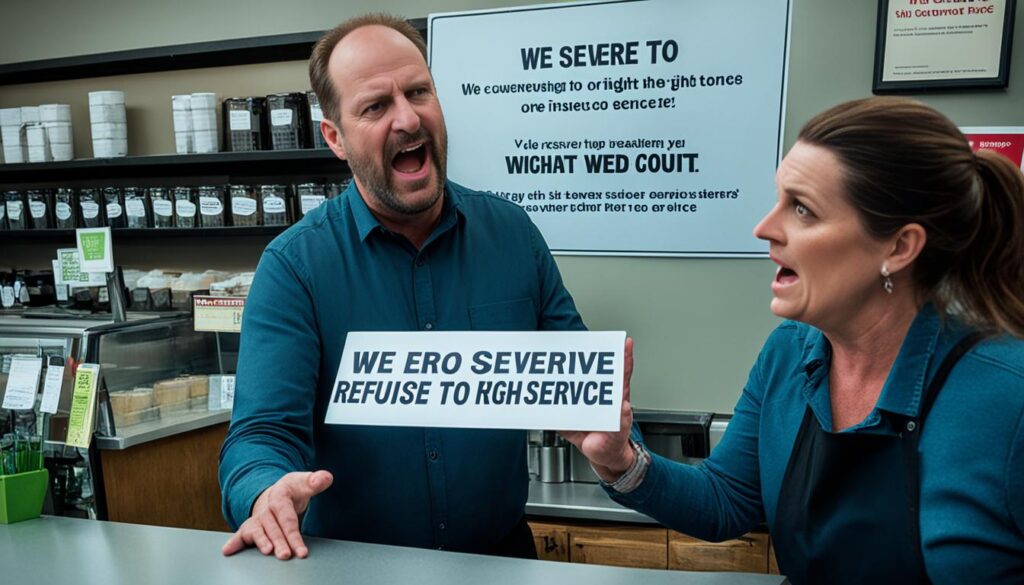As a business owner, you have the right to refuse service to customers for legitimate reasons. However, it’s important to be aware of the legal boundaries and understand the potential consequences. Discrimination based on protected classes is illegal, but there are valid reasons such as disruptive behavior, hygiene issues, or threats to safety that justify refusing service.
Being well-informed about anti-discrimination laws at the federal, state, and local levels is crucial. This knowledge will help ensure that you are within your rights when refusing service and minimize the risk of facing legal and reputational consequences.
Key Takeaways:
- Business owners have the right to refuse service to customers for legitimate reasons.
- Discrimination based on protected classes is illegal.
- Understanding anti-discrimination laws at different levels is essential.
- Refusing service can have legal and reputational consequences.
- Legitimate reasons to refuse service include disruptive behavior and threats to safety.
When is Refusing a Customer Illegal?
Refusing service to a customer based on their membership in a protected class is illegal. Businesses must adhere to anti-discrimination laws to avoid legal trouble. The Civil Rights Act of 1964 prohibits discrimination in public accommodations based on race, color, religion, sex, or national origin. Recent court rulings have extended these protections to include discrimination based on sexual orientation and gender identity. Additionally, the Americans with Disabilities Act prohibits discrimination based on disability in public accommodations.
Understanding the specific anti-discrimination laws in your jurisdiction is crucial to ensure compliance and prevent legal consequences. By refusing service based on a customer’s protected class, businesses can face lawsuits and reputational damage.
Protected Classes and Anti-Discrimination Laws
The Civil Rights Act of 1964, Title II: Protects individuals from discrimination based on race, color, religion, sex, or national origin in places of public accommodation.
Court Rulings: Recent decisions have protected individuals from discrimination based on sexual orientation and gender identity.
Americans with Disabilities Act: Prohibits discrimination based on disability in public accommodations. Requires reasonable accommodations.
Businesses should be aware of these laws, ensuring they provide equal access and fair treatment to all customers.
Next, let’s explore the consequences of refusing service and the potential impact on a business.

The Consequences of Refusing Service
Refusing service for legitimate reasons can have significant consequences for businesses. Even if a business has the legal right to refuse service, it may still face legal action and lawsuits for discrimination. These legal consequences can be both time-consuming and expensive, potentially resulting in financial strain and damage to a business’s reputation.
In addition to the potential legal ramifications, refusing service can also lead to reputation damage. When a customer feels discriminated against or mistreated, they may leave negative online reviews or share their experience on social media. These negative reviews and social media posts can quickly spread and have a lasting impact on a business’s reputation, potentially deterring new customers and affecting revenue.
It’s crucial for businesses to carefully consider the potential repercussions before denying service to a customer. Having clear and well-defined rules and policies for refusing service can help minimize the risk of discrimination claims and mitigate the negative consequences associated with such actions.
Examples of Consequences for Refusing Service
| Consequence | Description |
|---|---|
| Lawsuits for Discrimination | Businesses may face legal action and lawsuits for discrimination, resulting in financial penalties and reputational damage. |
| Reputation Damage | Refusing service can lead to negative online reviews, social media backlash, and long-term damage to a business’s reputation. |
| Negative Online Reviews | Customers who feel mistreated or discriminated against may leave negative online reviews, impacting a business’s online reputation. |
| Social Media Impact | Customers may share their negative experiences on social media, potentially reaching a wider audience and further damaging a business’s reputation. |
Businesses should strive to provide excellent customer service and consider alternative solutions before resorting to refusing service. Clear communication, empathy, and finding resolutions that meet both the needs of the business and the customer can help prevent potential legal consequences and maintain a positive reputation.

Legitimate Reasons to Refuse Service
In certain situations, businesses have legitimate reasons to deny service to customers. While it’s essential to prioritize providing quality service to all individuals, there are instances where refusing service becomes necessary to maintain a safe and enjoyable environment for both customers and employees.
Examples of Legitimate Reasons
- Disruptive Behavior: Customers who engage in disruptive behavior, such as shouting, fighting, or causing disturbances, can create an unpleasant atmosphere for others. In such cases, it may be appropriate to refuse service to preserve the well-being of everyone present.
- Hygiene Issues: Poor personal hygiene, like strong body odor or visibly unclean attire, can negatively impact the experience of other customers. Businesses may deny service to individuals in order to maintain a clean and comfortable environment.
- Dress Code Violations: Some establishments may have specific dress codes to foster a certain ambience or ensure safety. When customers violate these dress code policies, businesses reserve the right to deny service to uphold the desired atmosphere or prevent potential hazards.
- Threats to Safety: If a customer poses a threat to the safety of others or exhibits behavior that can cause harm, businesses are justified in refusing service to protect the well-being of their customers and employees.
However, it’s crucial for businesses to exercise caution and consider alternatives before denying service. In some instances, conflicts can be de-escalated through effective communication or resolved through compromise. By evaluating each situation individually, businesses can ensure that their decisions to refuse service are fair, justifiable, and in accordance with legal and ethical standards.

| Reason | Explanation |
|---|---|
| Disruptive Behavior | Customers engaging in disruptive behavior, such as fighting or causing disturbances, can compromise the safety and comfort of other customers and employees. |
| Hygiene Issues | Poor personal hygiene, including strong body odor, can negatively impact the experience of other customers and create an uncomfortable environment. |
| Dress Code Violations | Businesses may have specific dress code policies to maintain a certain atmosphere or ensure safety. Violations of these policies can warrant denial of service. |
| Threats to Safety | If a customer poses a threat to the safety of others or exhibits behavior that can cause harm, businesses have the responsibility to refuse service to protect everyone involved. |
Best Practices for Refusing a Customer’s Request
When it comes to refusing a customer’s request, handling the situation with tact and empathy is key to maintaining a positive relationship and minimizing negative outcomes. By following these best practices, you can navigate the delicate process of declining customer requests with professionalism and care.
1. Listen and Understand
Start by actively listening to the customer’s request and ensuring that you fully understand their needs. This demonstrates that you value their perspective and shows respect for their concerns.
2. Empathize and Apologize Sincerely
Show empathy towards the customer’s situation and acknowledge any inconvenience or disappointment they may feel. Apologize sincerely for not being able to fulfill their request, expressing genuine regret for any disappointment caused.
3. Keep the Response Short and Simple
When explaining the rejection, keep your response concise and to the point. Avoid going into unnecessary detail that may confuse or frustrate the customer further. Simple and straightforward explanations can help maintain clarity.
4. Use a Positive and Friendly Tone
Choose language and tone that conveys a positive and friendly attitude. This helps to soften the impact of the refusal and shows the customer that you value their business. Maintain a professional and courteous demeanor throughout the interaction.
5. Personalize the Response
Personalization is crucial in showing that you value each customer individually. Address the customer by name, if possible, and include personalized details in your response. This helps to create a sense of connection and understanding.
6. Offer Alternatives
Whenever possible, provide the customer with alternative solutions or options that may meet their needs. This demonstrates your commitment to finding a resolution and helps to alleviate any disappointment or frustration.
7. Ask for Customer Feedback
After refusing a customer’s request, encourage them to provide feedback or suggestions for improvement. This not only shows that you value their opinion but also presents an opportunity to learn from their perspective and further enhance your customer service.

Refusing Service Based on Mask or Vaccine Mandates
Businesses have the legal right to refuse service based on mask or vaccine mandates. As the COVID-19 pandemic continues, many businesses are implementing policies to prioritize the health and safety of their employees and customers. This includes requiring masks and, in some cases, proof of vaccination.
Requiring proof of vaccination is within a business’s right as long as it doesn’t discriminate against protected classes. It’s important to ensure that the policy is applied uniformly and doesn’t target individuals based on their race, religion, gender, or any other protected characteristic. Businesses should also be mindful of providing reasonable accommodations for individuals with disabilities or religious beliefs that prevent them from getting vaccinated.
To effectively implement mask or vaccine mandates, businesses should familiarize themselves with local guidelines and regulations. These may vary from state to state or even within different municipalities. By adhering to these guidelines, businesses can mitigate legal risks and promote a safe environment for everyone.
Communication is key when implementing mask or vaccine mandates. Clear signage and notices should be displayed prominently, informing customers of the requirements before they enter the premises. It’s important to provide information on any alternatives or exemptions available to customers who may be unable to comply with the mandates.
By proactively communicating and enforcing mask or vaccine mandates, businesses can create a sense of trust and safety among their clientele. This can also contribute to a positive reputation and potentially attract new customers who value the health-conscious practices of the business.
| Benefits of Implementing Mask and Vaccine Mandates | Challenges of Implementing Mask and Vaccine Mandates |
|---|---|
|
|
In conclusion, businesses have the legal right to refuse service based on mask or vaccine mandates. By implementing mask and vaccine mandates, businesses can prioritize the health and safety of their employees and customers, although challenges may arise. Clear communication, consistency, and an understanding of local guidelines are essential for successfully implementing these mandates while maintaining positive customer relations.
Denying Service as a Last Resort
When it comes to refusing service, it should always be seen as a last resort option. As a business owner, you should prioritize de-escalation techniques and have proper workplace violence training in place to effectively handle difficult situations. By focusing on de-escalation, you can prevent potential threats to the health and safety of both your employees and customers.
Before denying service, it’s crucial to carefully consider alternative solutions. This may involve finding ways to address the customer’s concerns or needs without resorting to a complete denial. By exploring alternatives, you can minimize the potential legal consequences that may arise from refusing service and also avoid negative online reviews that could harm your business’s reputation.
Should you find it necessary to deny service after exhausting all alternatives, remember that documentation and video evidence can play a crucial role in justifying your decision. These forms of evidence can support your reasoning and demonstrate that you acted within the boundaries of the law and with the best interests of everyone involved in mind.
FAQ
When can a business refuse service to a customer?
A business can refuse service to a customer for legitimate reasons such as disruptive behavior, hygiene issues, dress code violations, or threats to safety.
Is it legal to refuse service based on a customer’s membership in a protected class?
No, it is illegal to refuse service to a customer based on their membership in a protected class. Discrimination based on race, color, religion, sex, national origin, sexual orientation, gender identity, or disability is prohibited by law.
What are the consequences of refusing service?
Refusing service can lead to lawsuits, reputation damage, negative online reviews, and social media impact, even if within the business’s legal rights.
What are some legitimate reasons to refuse service?
Legitimate reasons to refuse service include dealing with disruptive or intoxicated customers, poor hygiene, dress code violations, or threats to the safety of other customers or employees.
What are the best practices for refusing a customer’s request?
Best practices include listening to and understanding the request, empathizing with the customer, apologizing sincerely, keeping the response simple and positive, explaining the rejection clearly, personalizing the response, and offering alternative solutions when possible.
Can a business refuse service based on mask or vaccine mandates?
Businesses have the right to implement mask or vaccine mandates, but they must be mindful of local guidelines and regulations and avoid discriminating against protected classes. Reasonable accommodations may need to be provided for individuals with disabilities or religious beliefs.
When should denying service be used as a last resort?
Denying service should be a last resort and only used when there is a potential threat to the health and safety of employees and customers. Businesses should prioritize de-escalation and consider alternatives before refusing service.
